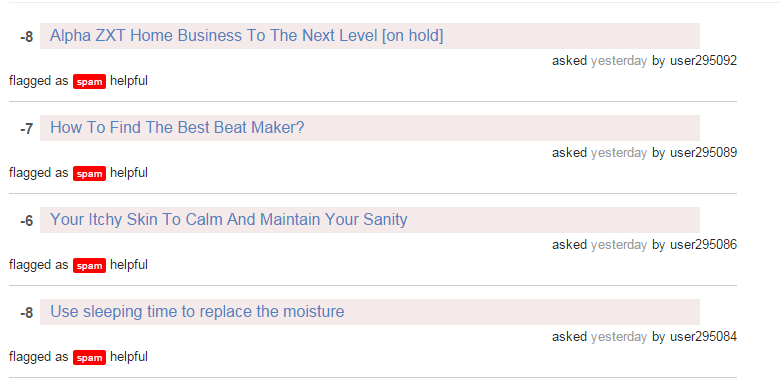Keeping Google away from brand new questions (especially those that trip enough spam heuristics) for a few minutes, to let the community review them first, sounds like a perfect win-win scenario:
We become a less tempting spam target.
Google sees a cleaner, more high-quality question feed, and so can serve better results to users.
The down side seems pretty negligible — basically, we may lose a few visits from people who just happen to Google for a question minutes after it was asked. Most sites live with that anyway, just because Google's crawling is not instantaneous; it's only because Google loves us so much that we do often get a pretty good approximation to instant indexing.
The tricky part is implementing this effectively. Basically, the problem is that we need to make these questions visible to active users, so that they can spot the spam and flag it (and potentially fix other issues, e.g. with legitimate but poorly written questions), while somehow temporarily hiding them from Google, and doing this in a way that doesn't prevent the real questions from being properly indexed later.
Now, I don't actually work at either SE or Google (although, you know, I am currently between jobs...), so what follows is necessarily based on indirect information and reasoned conjecture, but as far as I know, there are three main ways Google uses to discover new posts on SO:
They use the XML sitemap. According to our robots.txt file, SO does have one, even though visiting that URL yourself just gives a 404 error; apparently, it's set up to be only served to Google, or something.
They follow links from the main page (and other pages they've crawled), just like a normal user browsing the site would.
They follow the recent questions feed.
Now, keeping new (and spammy-looking) questions out of the XML sitemap for a few minutes is pretty trivial (i.e. just a simple matter of programming); the XML sitemap is only meant for search engines, so changes there have minimal effect on normal users.
The main page issue is also solvable — in fact, AFAIK we already have such a delay implemented there: new questions will first show up only in review, and on the new questions list, until they're about five minutes old or so. We might want to tweak our robots.txt and/or meta tagging a bit, to keep Google from crawling that new questions page, but that should also not be a major problem.
The Atom feed is a problem, though. Again, I'll stress that I'm not an insider in either company, but as far as I know, Google does make heavy use of such feeds for discovering new content, and so, for the proposed 5-minute "embargo" to be effective, we'd really need to implement it for the feeds as well.
But those same feeds are also used by normal users. Indeed, while I don't really use them myself, and so have no first-hand experience to report, I do suspect that we probably have active users who use those feeds to find new questions to review and improve, and whose user experience could be significantly hampered by hiding the very newest questions from the feed. (Or, then again, maybe not. Perhaps this calls for some real UX testing from SE's part?)
That said, one potential solution could be to only show very new questions in the feed for logged-in users. Presumably, Google doesn't have an account here, while most (all?) people actively looking for brand new questions to review and answer do. The only potential issue is that some of those users might be e.g. using some kind of an external RSS/Atom reader gizmo whose requests don't actually carry the cookies necessary to tell that the user is logged in.
Anyway, to summarize, I'd say that:
- this is a good idea, even if it obviously won't stop all spam from getting on Google;
- SE is already doing something like this, for the front page;
- it would probably be useful to implement such delays more widely;
- alas, some of the places we'd need to implement it for, like the recent questions feed, require some careful thought to prevent unwanted user experience side effects.
(Ps. One thing we almost certainly don't want to do is serve a 404 status, or a meta noindex tag, for new posts. While this would keep them out of Google's index, and while Google likely would recrawl them eventually, that kind of recrawling is not typically a high priority for Googlebot, and so some of those questions might take weeks or months to get properly indexed. Basically, while we may want to delay Googlebot's discovery of new questions by a few minutes, we should probably not be denying it access to any questions it does discover.)
